When Science Becomes the Enemy
From funding cuts to violence: How mRNA became ground zero in the war on expertise
We messaged each other on Tuesday with just three words: "Did you see?" We both knew what the other meant. After years of explaining to friends and family that yes, mRNA has always been in their bodies, and no, it doesn't change your DNA, we watched as nearly half a billion dollars in research funding vanished with the stroke of a pen (rather, a ‘key’).
While the cuts specifically targeted COVID and flu vaccine development, the ripple effects are devastating: the same platform technology, the same research infrastructure, and the same scientific expertise that drives all mRNA innovation are being gutted. The technology that could cure pancreatic cancer, treat cystic fibrosis, and stop the next pandemic was being dismantled based on misconceptions we've been fighting for years.
Despite its scientific success, mRNA has found itself at the center of controversy and public confusion since 2020. The recent funding cuts, justified by claims that contradict overwhelming scientific evidence, represent more than a policy shift; they signal a dangerous retreat from one of modern medicine's most promising tools.
From its role in basic cellular function to its revolutionary applications in medicine, mRNA is not a threat. It's a tool of hope. Let’s discuss…
The Role of mRNA in Cellular Function and Protein Synthesis
Messenger RNA, or mRNA, is a fundamental molecule in our cells. Each cell in our body makes and uses mRNA every day to make protein. mRNA acts as a courier, carrying genetic instructions from DNA to the cell's protein-making machinery. Every day, our cells produce mRNA to ensure the right proteins are made at the right time, essential for everything from metabolism and immunity to tissue repair.
Think of DNA as a cookbook stored in the cell's nucleus. mRNA is like a recipe copied from that cookbook and delivered to the kitchen counter (the cytoplasm), where ribosomes (the chefs) read the instructions and cook up proteins.
This elegant process, the transcription of DNA into mRNA followed by translation into proteins, is known as the central dogma of molecular biology.
Harnessing Nature: The Rise of mRNA Vaccines
Understanding this natural cellular process is crucial because it reveals how scientists have ingeniously harnessed our body's own machinery for medical breakthroughs. That’s right…researchers have learned to use this natural system to develop mRNA vaccines. (If there's one message that needs better marketing, it's this: mRNA vaccines use your body's natural processes—nothing artificial about it.)
These vaccines teach our cells to produce a harmless piece of a pathogen, like the spike protein of SARS-CoV-2, which then triggers an immune response. This primes the immune system to recognize and fight the real virus if encountered out in 'the wild' (think grocery store and soccer games to schools and your place of work).
The success of mRNA vaccines against COVID-19 has ignited innovation into a new era of rapid, adaptable, and scalable vaccine development. Unlike traditional vaccines, mRNA vaccines can be designed and manufactured relatively quickly, without the need to grow pathogens (like viruses) in labs, and have revolutionized vaccine development.
mRNA Technology is a Platform for the Future
The potential of mRNA technology goes far beyond vaccines for infectious diseases. Current research spans multiple frontiers:
Cancer Immunotherapy
Researchers are developing mRNA vaccines to treat cancers by encoding tumor-associated antigens (TAAs) or tumor-specific antigens (TSAs). These antigens train the immune system to recognize and destroy cancer cells. Clinical trials are underway for melanoma, glioblastoma, breast, prostate, and pancreatic cancers. As an example, a personalized mRNA vaccine for pancreatic cancer that uses a patient's tumor mutations to train the immune system to prevent recurrence has shown incredibly promising results. Early results from a Phase I clinical trial exhibited immune responses linked to delayed cancer return, supporting the ongoing larger Phase II study.
Rare and Genetic Diseases
Researchers are exploring mRNA-based protein replacement therapies for conditions like cystic fibrosis and metabolic disorders. mRNA could be used to produce missing or defective proteins directly in patients' cells. For people with cystic fibrosis (CF), a clinical trial currently underway is testing an inhaled mRNA therapy called RCT2100 for patients who have specific genetic mutations that don't respond to current treatments. This potential therapy aims to restore the function of the cystic fibrosis transmembrane conductance regulator (CFTR) protein in the lungs, targeting the root cause of CF rather than just managing symptoms.
Autoimmune Disorders
Innovative approaches using mRNA to induce a 'do no harm' signal, or immune tolerance, to immune cells are showing promise. For example, mRNA encoding modified myelin proteins to decrease and/or prevent autoimmune attacks to the myelin sheath surrounding neurons in the brain in multiple sclerosis are under investigation in mice with the future possibility for application in humans.
Combination Vaccines
The flexibility of mRNA technology enables scientists to develop combination vaccines that can protect against multiple diseases in a single formulation. This modular approach allows for more efficient vaccine design targeting multiple pathogens at the same time. Clinical trials have been underway for vaccines targeting flu and COVID-19 simultaneously.
mRNA is a Molecule of Hope
The explosion of mRNA research since 2020 is unprecedented. Thousands of peer-reviewed publications and numerous clinical trials now explore mRNA's potential across medicine. The infrastructure built during the pandemic, now under threat from funding cuts, could be the foundation for conquering diseases that have plagued humanity for generations.
Isn't it incredible how something so fundamental to our biology, mRNA, can be engineered to save lives, treat disease, and transform medicine?
Science Under Fire
We began drafting this article last week, before the horrific shooting at the CDC headquarters on Friday. Officer David Rose, a father of two with another child on the way, gave his life responding to an attack that left dozens of bullet holes in the buildings where scientists work to protect public health. The National Center for Immunization and Respiratory Diseases—whose buildings took the most bullets—houses the very people who helped develop the vaccines that saved millions from COVID, were literally under fire, reportedly because of anti-vaccine beliefs.
This is where we are now. The misconceptions about mRNA that we've spent years trying to correct have metastasized into something deadly. The funding cuts announced Tuesday weren't just policy decisions; they were an accelerant thrown on already dangerous flames of misinformation.
Friday's attack targeted the very scientists whose work could one day cure your loved one's cancer or help a child with cystic fibrosis breathe freely. These researchers have weathered years of online threats and political attacks, and now face actual violence. Yet Monday morning, they'll walk past the boarded windows and continue their work, because the diseases they're fighting won't pause for politics. Something has to change.
When officials eliminate funding while claiming mRNA vaccines "fail to protect effectively," they don't just contradict overwhelming scientific evidence. They validate the conspiracy theories that lead to violence. They ignore that these vaccines prevented millions of deaths. They dismiss the children with cystic fibrosis who might breathe easier, the cancer patients whose tumors might disappear, and the lives that could be saved in the next pandemic.
mRNA isn't just a molecule or a medical tool; it represents our ability to harness nature's own processes to heal. The infrastructure built during the pandemic, now being dismantled, could have been the foundation for conquering diseases that have plagued humanity for generations.
We face a choice: Do we let fear and misinformation rob humanity of one of its greatest scientific achievements? Or do we stand with the scientists who continue their work despite bullet holes in their windows, who believe that truth and evidence still matter?
The question isn't whether mRNA technology will transform medicine. It already has. The question is whether we'll have the courage to defend it, to fund it, and to ensure that those working to save lives can do so without fearing for their own.
Stay Curious,
Unbiased Science
Want to support our work? The best way is to subscribe to our Substack and share our content. While all our articles are always completely free to read, paid subscriptions help sustain our in-depth reporting on public health and science topics. Thank you for considering it!




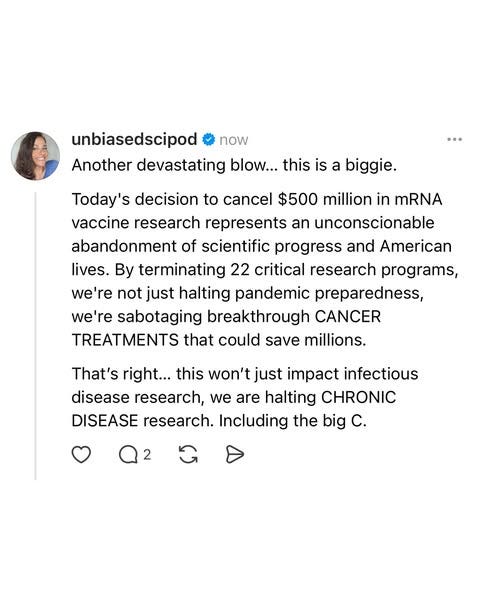
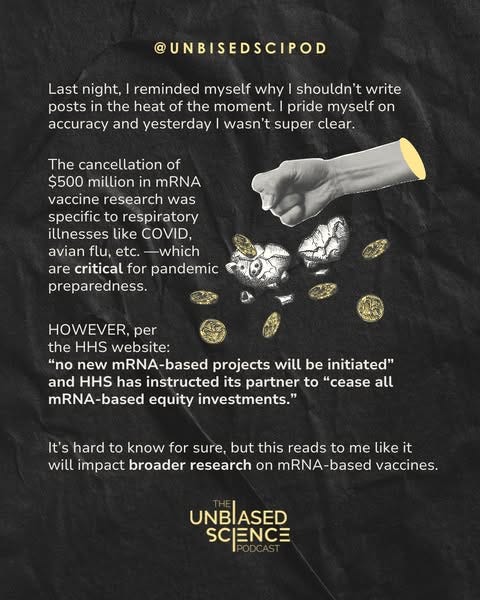
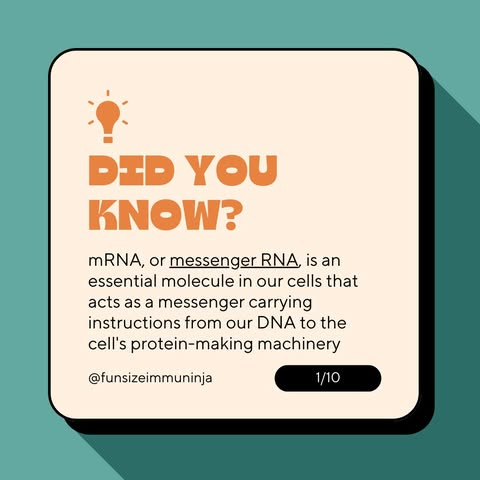
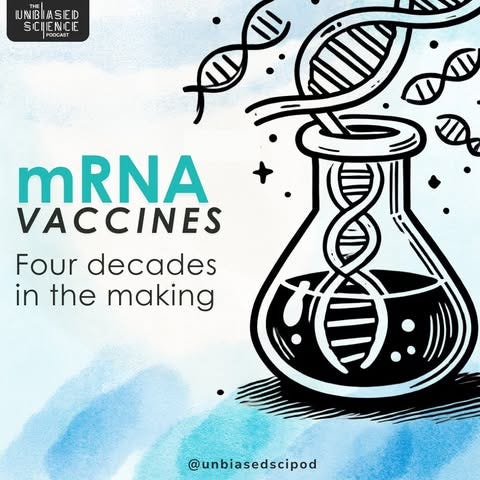
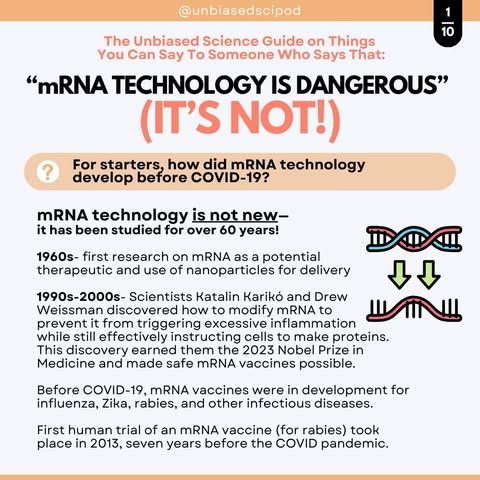
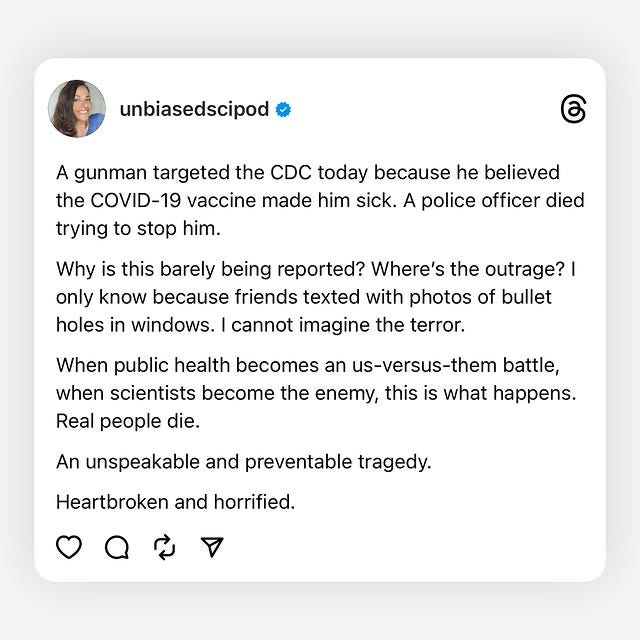

An opportunity for other countries to step up and pick up the research (and researchers) doing this critical work. 🤔 Thank you for calling this out, especially the shooting 😳🥹
As a retired Secondary (13-18yo) Science teacher I can not get my head around how people trust some random jerk on the internet and not people who actually do the work, because THEY WANT TO HELP!
Ok many Scientists are poor communicators but this is where you are so important and doing such good work. Thank you👏🏻👏🏻👏🏻
I’m reminded of the old story about a scientist being asked if something is 100% safe, they reply No (99.5%) and the headline is: Scientist says #### is not safe! 🙄
Good luck!
I participated in some of the initial research on mRNA as an undergraduate in microbiology, many years ago. I was excited to see that the technology became applied to save so many lives through the hardest years of the COVID pandemic. The current view by some reminds me of an undergraduate course about the Dark Ages. I recall being taught that during the Dark Ages, the older the source of information, the more accurate it was deemed to be. They felt that the closer to creation the less tainted. It took a millennium, the Reformation, and the Renaissance to change that mind set. It is sad to see that some want to go back to that mindset, because they fear change, don't understand the technology, or both.